'How to separate the fiction,
contradiction, from the fact'
A substantial BtP exclusive with Keith Reid,
about his 2018 solo album, In My Head
Keith Reid meets me, at his
own suggestion, on the steps of the Victoria
and Albert Museum in Kensington. Jestingly I inquire if this famous edifice is ‘his local’,
his London residence being so close. ‘It’s the old cliché,’ he replies. ‘Live so
close, yet I haven’t been here in years.’ As we meander through the Chinese
Gallery – each assuming the other knows the way to the Madjeski Courtyard and
its open-air café – he adds that it’s no different the other side of the
Atlantic … you can keep a place in Tribeca, but you haven’t necessarily climbed
the Statue of Liberty.
 Keith is no stranger, however, to
nearby Hyde Park,
where, he tells me, he belonged for a year to the
Serpentine Swimming Club, and
swam there daily at 7 am. ‘In winter you can’t stay in for long, of course, but
the blood rushes out to your skin …’. Sounds exhilarating, I say, but is it good
for you? With a gesture straight out of Waiting for Godot he indicates
his own person, inviting me to judge for myself.
Keith is no stranger, however, to
nearby Hyde Park,
where, he tells me, he belonged for a year to the
Serpentine Swimming Club, and
swam there daily at 7 am. ‘In winter you can’t stay in for long, of course, but
the blood rushes out to your skin …’. Sounds exhilarating, I say, but is it good
for you? With a gesture straight out of Waiting for Godot he indicates
his own person, inviting me to judge for myself.
Freshly turned 72, Keith remains
enviably lean and nimble … alarmingly so, in fact, when he dodges into traffic
to cross the Cromwell Road as we part a couple of hours later. Readers may feel
that he dodges pretty nimbly around one or two of my questions as well; but our
two hours’ conversation feel open, thoughtful, intriguing … and always affable.
 Our topic – pretty well
exclusively – is his new album, In My Head,
due for UK release on 7 December, and a fortnight later over in America: buy or
pre-order it
from Amazon.co.uk or
from Amazon.com. I’ve been listening to it for a week – in a nutshell, it's surprising, engaging and thought-provoking ... a
must-have – and quickly
find out that I’m the first person he’s talked to about it. He’s interested, and
amused, to know how it’s struck me.
Our topic – pretty well
exclusively – is his new album, In My Head,
due for UK release on 7 December, and a fortnight later over in America: buy or
pre-order it
from Amazon.co.uk or
from Amazon.com. I’ve been listening to it for a week – in a nutshell, it's surprising, engaging and thought-provoking ... a
must-have – and quickly
find out that I’m the first person he’s talked to about it. He’s interested, and
amused, to know how it’s struck me.
Like Keith’s previous solo
offering, 2008’s The Common Thread, In My
Head features music by various composers sung by various artists, and
consequently offers a less cohesive listening experience than the typical Procol Harum record of yore …
arguably the only similarity is that in
both cases all the words were written by Keith.
‘Do you think of the new
album as a compilation?’ I ask. He weighs his answer carefully.
KR
Not a compilation, no, it’s an accumulation, because I write songs all the time.
It’s a question of accumulating songs until you have enough to make a record.
I remind him that,
in 2008, he declared he had 'plenty of
other items that might have made the cut' but, as he then observed, '55 minutes
[thirteen tracks] seems plenty: sometimes too much is worse than not enough.'
BtP
I notice the new collection [which comprises ten songs over about forty minutes]
has been ten years in the pipeline ...
Well, goes to show, time flies!
Laughter.
Ten years, what’s wrong with that?
More laughter.
Well I haven’t been working on it for ten years. These songs have been written
over the past few years, some more recently than others. But I got down to
serious recording in … let’s think … the serious commencement of this record,
when I got started in earnest, I can date clearly, because I was working in
Sweden and I was driving to the airport when we heard on the radio that same
weekend
Julian Assange took refuge in the Ecuadorian
embassy.
Was that cause and effect?
Yes
– laughter –
he needed to get out of my way!
Of Keith’s 2008 singers – Steve
Booker (2 songs), Chaz Jankel (1), Southside Johnny (2), Terry Reid (1), Michael Saxell
(1),
Bernie Shanahan (2), Chris Thompson (2) and John Waite (2) – only Waite and Booker
are involved again in 2018; and of the fourteen 2008 composers – Steve Booker*,
John DeNicola, Barry Goldberg, Jeff Golub, Chaz Jankel, Anthony Krizan*, John
Lyon, Matt Noble*, Andy Qunta, Maggie Ryder, Michael Saxell, Mark Taylor, Chris
Thompson, John Waite* – again only a small minority (marked with asterisks) are featured in 2018.
You didn’t revisit many of the
collaborators from the first record?
That wasn’t deliberate, it was just the way
it worked out.
The John Waite and Steve Booker
songs on In My Head, are they coeval with those composers’ contributions
to The Common Thread?
I don’t think so.
One strong point of continuity is
the record label, Rockville. I ask Keith why his music is being published by a
small company in faraway
Bavaria.
I just really like the guy who
runs the label. Manfred, who did the last record: he wanted to do this one, at
the same time as I wanted to do something …
When Manfred Plötz
was asked, in a recent interview, how he would describe Keith's new collection,
his response included 'In My
Head is a wonderful collection of soulful songs, featuring six different
singers. But it's not only the music. It's also Keith's extraordinary talent for
writing lyrics. Keith Reid is a wonderful poet, and he's a unique phenomenon in
music history: being an essential part of a band (Procol Harum), but not sharing
[the] stage.' Plötz
himself plays in the band
Pavlov's Dog, whose new album – resonantly entitled Prodigal Dreamer – is
released the same day as Keith's.
How did you two become acquainted?
I think
somebody introduced me to him but … I really can’t remember …
Reid's memorial drive appears to
stall, and he laughs. We both know there will be quite a lot of answers of this
kind. The Assange/Ecuadorian Embassy episode was August 2012, so I realise I’m not
necessarily asking Keith about recent history. I turn to specifics of the
record.
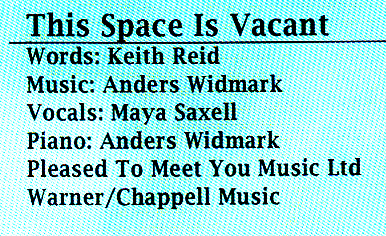 The
first track on the album is a huge surprise, I tell him. This Space is
Vacant (4.10) – intimately sung by Maya Saxell, and accompanied
exquisitely at the piano by Anders Widmark, a big name in Swedish jazz – marks a
major departure from the tone and density of The Common Thread. I ask if
Maya is related to 2008 Reid collaborator Michael Saxell, the Grammy-award
winning Swedish hit-meister. The answer comes back, immediate, fluent.
The
first track on the album is a huge surprise, I tell him. This Space is
Vacant (4.10) – intimately sung by Maya Saxell, and accompanied
exquisitely at the piano by Anders Widmark, a big name in Swedish jazz – marks a
major departure from the tone and density of The Common Thread. I ask if
Maya is related to 2008 Reid collaborator Michael Saxell, the Grammy-award
winning Swedish hit-meister. The answer comes back, immediate, fluent.
Maya, yes,
she’s the daughter of Michael. He played me a tape of her doing a Bruce
Springsteen song, and I really liked the way she did it. And I filed her away in
my memory: ‘I really like that girl’s voice’. And later on, when I was looking
for the right singers for these particular songs, I thought, 'Let’s see how she
sounds.'
This Space is Vacant
is a song about the narrator’s interactions with a homeless person whom he’s
wont to pass in the street, but who’s suddenly absent. The first verse uses deft
and ingenious half-rhymes to set up the scene:
I used to see him every day, sleeping on the pavement
But lately when I pass that way I see
his space is vacant
‘Spare change,’ he used to say, ‘I’m
not your entertainment’
The straightforward good cheer of
the indigent – who asks ‘why are you so sad?’ – is contrasted with the
ambivalent thinking of the walker, who sometimes, like a bad Samaritan, crosses
the street to avoid him; and we gradually learn that he himself has no
particular place to go; the parallel is drawn and we start to wonder whether
he’s a candidate for the empty place on the pavement. I’m puzzled, perhaps
haunted … by a ‘disconnect’ between this tale of two directionless men and the
womanly voice that sings it. Close-miked, sultry Maya’s style would suit a
bedroom confessional, and chimes askance with Reid’s unflinching interrogation
of his imperfect relationship with the homeless, ultimately absent
man. The interiority of the performance makes a strong impression … yet the
story is the tale of a street.
What are we to make of this ambiguous
narrator?
I don’t think
of him quite the way you do …
But isn’t that a giveaway? We’re saying
‘him’ not ‘her’. You’ve given the lyric to a woman.
Particularly
with these Maya tracks, the thing I really liked about her is that she really
inhabits the songs, she’s living it. She does in my opinion what a really good
singer should do, sound as though she means it, and she’s experienced it. And
basically, that’s what I’m looking for in deciding who’s right for different
songs: people who will really inhabit them.
In fact Maya inhabits forty
percent of the new album and is in every way a standout. I wonder if Keith had
written with her in mind.
No, I wrote
those songs before I’d ever met her. All the songs on the record … they’re all
about me in some way – and that’s partly why I called it In My Head – and the
singers are just … I’m using different people to represent, no, to voice me. But
that’s always been the case; that was the case with Procol Harum songs too.
I suggest that in the Procol days
fans felt they were effectively hearing the Reid voice, even though it was
almost always Gary Brooker singing the words. Though Gary sang soulfully, it was
never histrionic; he was never acting a part, and seemed a relatively
transparent vehicle for the lyricist’s insights and imagery. But now, given the
profusion of varied characters voicing Keith’s thoughts on these two
solo records, it’s hard not to think in terms of personalities and how these
match – or colour – the material. Maya Saxell, the only woman on the team, is a
radical departure and brings something really new to the Reid world: one can't
help noticing that, if her name were an anagram, it would be only one
letter adrift from ‘I am all sexy’.
Is it?
Laughs.
I’d
better not tell her that. Look, initially, I just did the piano, and actually at
that stage I hadn’t made a decision what I was going to add to the tunes apart
from getting the right person to sing it.
Keith tells me that composer
Anders Widmark, in Sweden, had not only played some brilliant piano –
conspicuously, his chord voicings vary (sometimes fleetingly) to reinforce the
emotion of the lyric – but had provided a guide vocal.
You were there for his piano recording?
I was
responsible for the piano recording! He’s a fabulous piano-player.
And how do you know Anders?
As with
Michael Saxell … these things recede in my mind, but I must have met him through
the famous Ingmar Bergman [story here!]
How often one says that!
(Laughter).
So you went to Sweden and did stuff with
Maya?
I went to
Sweden – to Gotland, to be precise – to record the tracks with Anders, who wrote
the music for those three songs. Maya lives in Vancouver.
You mean they’re not playing together in
real life?
I’ve given
something away there. You see this is the wizardry … when people say, 'What do
you do in a recording studio?' ...
Is there anything that’s ever done in your
absence?
I produced it
all. Hands on with everything, all over the place. The record was made in
Sweden, America, and Canada. Vancouver’s in Canada, isn’t it?
So you were in Vancouver?
No, that’s
where Maya is; I sent the tunes to her, and then we talked about it a lot, and
she sent her parts over.
Amazing. It really sounds like a man and a
woman playing together, when you've just set up a mic and happened to get
one brilliant take. Whereas there are other tunes in this accumulation that positively invite us
to imagine the multi-tracking involved. I’m almost shocked to learn that Maya
was not curled on a cushion adjoining the piano stool, but recorded her part far away in
space and time, and then simply dropped it into Anders Widmark's recording.
There were
some technical difficulties which had to be sorted out, so it wasn’t quite as
simple as that. But it is totally organic. We married the two elements together
with Matt Noble – he’s my trusty compatriot in that respect. Back in the day a
producer was always in the room at the time, but I don’t think that’s the case
these days.
Can you remember why
you made this one the lead track?
It kind of
set the tone for the album, when the Maya tracks were done, and I thought
‘that’s the kind of record I’d like.'
You didn’t think of doing a whole album in
that way?
Pause.
Maybe one of
these days.
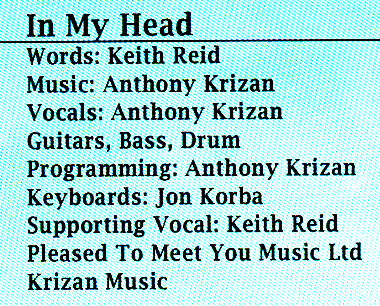 Needless
to say the second track, which gives its name to the whole collection, presents
an enormous contrast. Prominent lead guitar (textural, not really melodic, and
sometimes recorded backwards), groovy beats, and an assertively mobile bass line are provided by The Spin
Doctors’ sometime guitarist Anthony Krizan, who also sings.
Needless
to say the second track, which gives its name to the whole collection, presents
an enormous contrast. Prominent lead guitar (textural, not really melodic, and
sometimes recorded backwards), groovy beats, and an assertively mobile bass line are provided by The Spin
Doctors’ sometime guitarist Anthony Krizan, who also sings.
Anthony? I met him through
Frankie LaRocca. He’s a
[New] Jersey guy, and I met him
when I did the overdubs on Thieves’ Road at his studio in Jersey. That’s
where I did In My Head, in his studio.
The highly original lyric presents two voices
debating the relative merits of original versions and covers, in terms both of
songs and of films. One voice puts the younger point of view and the other
responds with self-deprecating humour recalling Procol’s Yours if You Want Me.
I remark that the energy and weird vocal style of In My Head
(3.57) make it a second standout in a row, and remind me of
The Only
Monkey, the most aggressive and challenging song from the previous album.
I
do like that a lot. I’m going to redo that tune one of these days.
Why’s that?
Do it with
… (he ruminates)
Orchestra and chorus?
(laughter)
Some people
thought it was just comic. And it was intended to be humorous, but not comic, I
don’t think.
Chuckles.
But anyway I will redo that song at some point.
Whereas
The Only
Monkey was
bleakly misanthropic (its bluntness underlined by some brutal key changes in
Chaz Jankel’s instrumental track) In My Head is genuinely funny.
In my head I’m Motörhead, in my head I’m
Lemmy
In her head I’m halfway dead, old and
weird and smelly.
In my head I’m Motörhead,
dangerous and crazy
In her head I’m Father Ted, old and
weird and lazy.
At least, it starts out funny,
though the tone shifts when the ‘old and weird and lazy’ voice declares
‘Now it’s all a
piece of shit and no-one gives a fuck’
Yes, but the
whole song is supposed to be like that, about remaking things.
I’ve never heard that song before, I think this record’s cool
You always say the old one’s best,
you’re just a sad old fool.
Do you really think that old versions are
always better, and remakes always dodgy?
Yes,
absolutely.
You’re not just adopting a grumpy old man
position?
It’s a wry
commentary! But yes, the music was always better then, but it isn’t worse now,
because there’s lots of great music coming out now.
The two generations in that song are
characterised by different voices. Who are the two vocalists?
It’s all
Anthony, all Anthony Krizan.
But I notice there’s a ‘Support Vocal’
credit for ‘Keith Reid’.
It’s in the
chorus, ‘In my head I’m
Motörhead’.
I’m there. I’m in there.
Singing?
[The chorus is a primitive riff, delivered in a
distorted, manic holler]
I don’t think
I’d call it singing. Anyway, through the magic of the recording medium, I’m in
there.
I remind Keith of his previous
Hitchcockian micro-role on The Common
Thread … another parallel with The Only
Monkey, in fact.
I’d forgotten
about that.
But whereas the
Monkey song
is a critique of all humanity, this one is more about the foibles of one character, and it’s more
culturally specific, or even limited. I ask if
Father Ted is known
in the States?
A good
question: we’ll find that out. They get BBC TV over there, they have comedy
channels over there, and considering there are such a lot of Irish people in
America … put it like this: (a) I don’t know, and (b) I imagine so.
And (c) it’s not even the Father Ted
character himself who’s ‘old and weird and lazy’ ... isn't that the alcoholic,
Father Jack?
Is that
right?
Uproarious laughter.
Arguably of course this Father
Ted error, from the narrator, could be taken as an additional affirmation of
his out-of-touchness with relatively-recent mass entertainment. But before I can
come out with that, Keith plays his own get-out-of-jail card.
Well anyway,
it’s Art. I’m allowed to …
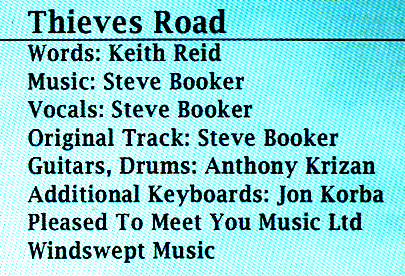 Thieves’
Road (4.45) doesn’t concern itself with jail, nor the courts, but offers
a kind of admonition to an unnamed ‘you’ who ‘… rode your winning streak down
where the crossroads meet’. The language remains somewhat indeterminate, and,
like the music, doesn’t offer too many surprises. Sprightly acoustic rhythm
guitar, solid four-to-the bar bass, rhythm shakers, piano and languid, slightly-distant lead guitar offer a pleasing,
if unvarying, listening experience. By
comparison with the foregoing numbers, this Booker/Reid song seems a more
mainstream piece of work.
Thieves’
Road (4.45) doesn’t concern itself with jail, nor the courts, but offers
a kind of admonition to an unnamed ‘you’ who ‘… rode your winning streak down
where the crossroads meet’. The language remains somewhat indeterminate, and,
like the music, doesn’t offer too many surprises. Sprightly acoustic rhythm
guitar, solid four-to-the bar bass, rhythm shakers, piano and languid, slightly-distant lead guitar offer a pleasing,
if unvarying, listening experience. By
comparison with the foregoing numbers, this Booker/Reid song seems a more
mainstream piece of work.
Did all these songs start with the words?
Yes.
Probably. … probably. I’d have to go through it in my head, but probably.
You made a precious vow
but you broke it anyhow
You’re out of favours
You hid your smoking gun
out where the buffalo run
you’re no angel
Thieves’ Road struck me as a
possible exception … it’s quite unusual to have six lines before the chorus, and
Steve Booker plays around with the vocal rhythms, to fit them into
the song meter. I wonder if there was a rhythm track first.
I think he
had a feel first: I think he told me he’d got something, and then I started
writing.
So Steve Booker, he’s writing, singing,
multi-tracking. It’s nice that the who-did-whats here are more complete than on
the previous record.
Yes,
Steve did the
basic tracks, but then we added to them: I did that in New York, in Jersey.
Are there any unlisted musicians?
I’ve tried to
be pretty exact. Jon Korba played the mellotron on Thieves’ Road, and
piano.
Is Korba another Noble associate?
No, he’s with
Hall and Oates sometimes, I think. He’s a Jersey guy. They all know each other.
Do you work from a list of singers, mixing
and matching, mating the right voice with the right song?
It works in
different ways. With In My Head, for instance, it hadn’t particularly
been my intention for Anthony Krizan to sing it, but when we were putting the
tune together I thought he sounded really good on it, and I didn’t feel there
was any reason for me to get anyone else to sing it.
I suppose the modern-day song-writing
process almost always involves a recording-machine running, so the songwriter is effectively
making a demo on the fly?
Yes, and
quite often the composer will do a guide vocal, even if you get together with
the intention of writing a song for a particular artist.
Is that what happened with You’re the
Voice? You released (composer) Chris Thompson’s early version on The
Common Thread, but of course
the huge hit came with
John Farnham’s voice.
You’re the
Voice was for Chris, and Chris was going to do it, and I know he kicks
himself to this day, although it wasn’t his fault; that song was for an album
that he was doing but the producers told him they didn’t think it was a very
commercial song, and left it off the record.
As almost happened with Over the Rainbow and
the Wizard of Oz producers.
I didn’t know
that. Another example, All I Need to Know, the one that John Waite’s
singing, I wrote it with him and Anthony Krizan. And you know, if you’re writing
with John Waite … he’s going to sing it …
You were writing in the room with him?
I can’t
remember. Not in the room … but he was involved all the way throughout, and
no-one’s going to put that across better than him … they’re just not! I suppose
the rule of thumb is that if you’re working with people who are singers in their
career, you pretty much will end up with them singing the song … though it
doesn’t always work out like that.
Almost all your singers seem to be composers
as well … I gather Maya Saxell writes music for films.
She’s done
plenty of things. Actually she had a band in Sweden, called ‘Said the Shark’.
They’re really good!
I like the fact that
their album is called
Always
Prattling on About Wolves.
There you are
… a Swedish sense of humour.
There’s paradoxical Reid wit in
Thieves’ Road, as well as the Wild West imagery:
There’s a thousand ways to go astray when you look for fools’ gold
And you’ve got to be an honest man
when you take the thieves’ road
When you write something like ‘look for
fools’ gold’, are you aware that you’re sending a little message to Procol fans
there?
No. Not
intentionally.
You did have a phase of quoting yourself …
and we see ‘sink or swim’ on Ten More Shows.
I did that a
few times on The Prodigal Stranger deliberately. But the answer, now, is
definitely not.
But the album cover, and the video, and
the lawsuit song … I’m sure we’ll come on to these things … they definitely
speak to a constituency that’s immersed in your past history.
Yes.
I wonder why you’ve changed your by-line
from ‘The Keith Reid Project’ to ‘The KRP’?
I preferred
it. I don’t know if that’s been a wise choice. I didn’t understand this thing
about [search-engine] algorithms. If you type in 'The KRP' it won’t come up straight away, but
there are plenty of other KRPs
[as
well as being the TLA for numerous businesses, KRP is also clubbers’ shorthand for ‘kissing random
people’].
If you type
in 'The Keith Reid Project' it comes up straight away. So … had I known that, I
might not have done that.
Laughs.
I might
not have done it.
I preferred
it, to try and get it off of me. In an ideal world, I’d like it to be 'The KRP'
just so … I’m not quite sure why …
You’re known for not being particularly
self-promoting.
It’s not
really that, it’s just … I don’t really know why. Maybe it’s snappier.
But it distances In My Head from
your previous record, doesn’t it? Says it’s not more of the same.
Yes, I think
so, and that’s a useful by-product. I didn’t deliberately set out for it not
to
be more of the same: but I didn’t want it to be more of the same. I’d always
want to push forward.
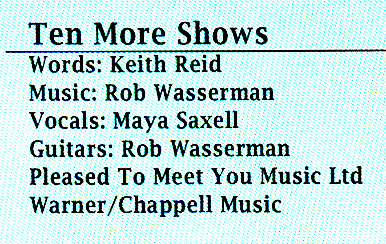 On
the promo video for the
album, the acronym is unpacked or expanded: on screen we see ‘KRP, the
Keith Reid Project’.
On
the promo video for the
album, the acronym is unpacked or expanded: on screen we see ‘KRP, the
Keith Reid Project’.
That’s
Manfred, being mindful of algorithms. He stuck that on at the end.
So it’s Manfred who made the
Ten More Shows film
[3.17]?
No, he had
nothing to do with it.
So … who made the film?
Maya Saxell …
well it’s my idea; I spoke to Maya because she and her partner are film-makers,
and I told her what I wanted. And then she completely ignored that
… laughs …
I didn’t storyboard it, but we discussed it in great detail, and then they came
up with their own interpretation of what I was trying to communicate. But I love
it.
It's quite enigmatic in a David Lynchian
sense, with the little animal baubles hanging from threads in a forest.
No, nothing
to do with me.
And you’ve got Maya, wearing a sailor’s
outfit, with ‘Hero’ written on her hat, which I take it relates to the ‘hat full
of dreams’ in the song.
That was
totally me.
She’s rootling about on the forest floor,
and she exhumes a tiny piano.
The
film-makers came up with that bit.
Are you able to comment
on the subsequent image, where she reburies the piano, with a door-key inside
it?
No, that’s …
the magic of the movies.
Do you mean, it would destroy it to talk
about it?
Yeah …
But you can imagine the conspiracy
theorists: ‘buried key, dangling threads: key / thread = Keith Reid’’
‘It’s all
there …’
(doubtful noises)
And it’s not a great leap of
imagination to relate certain passages to Keith’s time with Procol Harum, and
the downward trajectory –
in commercial terms, at any rate – of their career.
They say you’ve got to
play to win
But life ain’t always sink or swim
Sometimes you’re playing second
fiddle
Sometimes you’re just stuck in the
middle
I point out that when you listen to Schubert you'd be daft to wonder if Fischer-Dieskau
himself is really obsessed with a Schöne Müllerin … but
on The KRP album, because there are so many different voices, the question is
bound to arise as to whether they’ve been chosen because their own history or
nature matches some particular aspect of the lyric. Or does Keith feel that the
dissonance between Maya's youth and the ‘heart full of scars … old guitar’
creates some kind of third aspect of interest – such as one might detect in
certain Elvis
Costello songs? Astutely he responds that a young woman could indeed own an old
guitar, or suffer with a scarred heart.
In fact, though, our narrator here is both
female and male, since Maya’s voice is underscored by a man’s voice throughout –
somewhat reminiscent of the way latter-day Leonard Cohen used female
shadow-singers.
Whose is the male voice? It’s not listed
in the credits.
I can’t
recall for the moment.
The video, of course, focuses
strongly on Maya, unequivocally reinforcing the feminine side. Yet she’s
impersonating a male mariner, and the 'Hero' hat, which adorns Keith’s head on the A Salty Dog cover, is
abandoned in the wood, hiding … or perhaps marking … the piano’s grave.
The song appears to be performed in a dark
wood … nothing very obviously connected with the lyrical material. You specified
that?
No, I’m not
going to take away from any of the magic … but I didn’t specify that, I will say
that much. I will tell you this, we started off with
On
the Town¸ the Gene Kelly and Frank Sinatra movie … that was the
starting point …
laughter ...
that’s where
we started.
More
laughter.
I’m reminded of the
often-mentioned yet inexplicable fact that Midnight Cowboy was the mental
springboard for The Dead Man’s Dream, but the conversation passes
to the music of the present track, and its composer.
Rob Wasserman: he was a Lou Reed sideman,
and San Francisco Conservatory of Music alumnus, I believe?
Unfortunately
he’s passed away
[1952–2016]
and he’s a
fabulous bass player, he’s got Grammies and stuff; a phenomenal musician, sorely
missed. He plays any kind of bass but he’s primarily known for playing upright
acoustic bass, and he had a band for years with Bob Weir from the Grateful Dead;
I knew him through that.
The song is marked by a simple
melody and a memorable opening hook. There's been quite a bit of overdubbing –
shaker, guiro and fretless bass alongside the acoustic guitars – yet it could
very well be performed, in an acoustic folk club setting perhaps, with just the
two voices and one strummer. The aural mood is resigned, perhaps even mellow,
and arguably this takes the edge off a lyric which, printed in the CD booklet as
all these song words are, feels more rueful.
I like what you’ve done with
William Blake: ‘see a world in a grain of sand’ becomes ‘build a wall from a
grain of sand.’
I didn’t know
that.
It wasn’t a misheard phrase?
No.
You like upending proverbs, making us
reappraise clichés and well-known quotations by distorting them slightly
[1967's 'if
music be the food of life’ pointed the way]
…
I’ve done
that in the past.
Or ‘They say the piper calls the tune’.
They don’t say that, they say the opposite.
On
one level I quite often get these things wrong! On another level maybe
subconsciously my brain must be telling me it’s better this way.
Here you tell us ‘You can buy a life right
off the shelf’? How does that relate thematically to the rest of the song?
Isn’t that
what the advertisers tell you? I think that’s what the advertisers would have us
believe.
I wonder why Ten More Shows was the song chosen for the video.
Manfred just
said, ‘Any chance of doing a video for that song?’
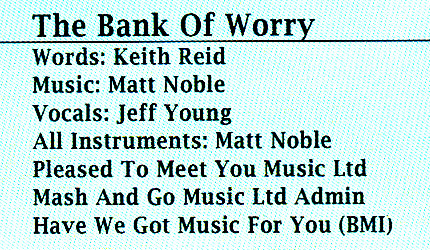 One
song on the album that does instantly conjure up its own visual imagery is
The Bank of Worry (3.05): it’s so easy to imagine a film in which its
genial singer, Jeff Young, beckons viewers inside the portals of some imposing
building.
One
song on the album that does instantly conjure up its own visual imagery is
The Bank of Worry (3.05): it’s so easy to imagine a film in which its
genial singer, Jeff Young, beckons viewers inside the portals of some imposing
building.
Welcome to the Bank of Worry
Everyone is in such a hurry
No-one stops to smell the roses
The Bank of Worry never closes
Reid’s lyric worries away at this
idea, stating the title phrase thirteen times in a mere twenty tightly-rhymed
lines. The music, sumptuously multitracked by composer Matt Noble, nicely
contradicts the systemic anxiety of the song words. It uses
double bass, string sounds, understated brass, electric piano, gentle drums,
congas: the texture is both rich and uncluttered, and it builds to a
true soul conclusion, the declamatory lead voice duetting with choral
responses. In the final bars we hear what may well be a guide rhythm track from
a drum machine, but there's nothing mechanical about the foregoing song
which – for my money – is over too quickly.
How did The Bank of Worry start?
Was that an overheard phrase?
With that
idea
… pause …
I was thinking about how it never stops. It’s a way of life. But it’s not a
phrase that I heard, it’s something that came to me.
In the past you’ve been a bit caustic
about bankers (viz As Strong as Samson)
This is a more generalised thing. It’s not specifically about bankers per se,
it’s about being sold worry … because it’s always there.
Could it
have been the internet of anguish, or the
national grid of unease?
Yes, but that
wouldn’t sound very poetic, would it?
I’ve known Jeff for years, a very long
time, and I’ve written songs with him in the past, I write songs with him
occasionally. He makes records himself, and he’s been in Jackson Browne’s band,
and with Steely Dan. Ah, it’s all coming back to me now … I know him from New
York, a guy who’s been around in New York for a while and he went to live in
California … he’s a good friend.
He’s also a good singer. His warm
tones recall Sam Cooke to these ears … and the voice could even make a
reassuring job of an advert for a real-world bank. Its cool, relaxed feel makes
the conclusion – which abandons the rhetoric of smooth endorsement for an abrupt
and chilling moment of truth – even more alarming:
The Bank of Worry wants your soul
The Bank of Worry’s out of control
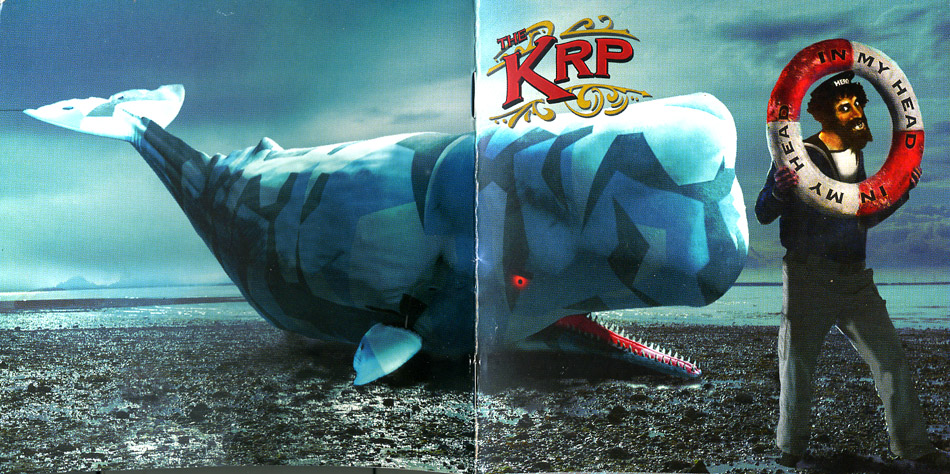 It
feels a good moment to turn to the rather worrying record cover, which shows a
man and a red-eyed whale. The man's body-language looks untroubled … he’s got a lifebelt, after
all … yet both he and the whale are on dry land … and they're both baring their teeth.
It
feels a good moment to turn to the rather worrying record cover, which shows a
man and a red-eyed whale. The man's body-language looks untroubled … he’s got a lifebelt, after
all … yet both he and the whale are on dry land … and they're both baring their teeth.
That’s my
idea too. Dave Cook is a good friend of mine, who very kindly did all the
graphic design.
You devised the imagery? What would you
like to say about it?
Well, what
should I be saying about it?
The album hasn’t got a picture of you
anywhere, unless people know that’s you in the lifebelt from A Salty Dog.
The top half of the 'Hero' reminds us of Procol Harum, the bottom half – the trousers
– reminds
us of the human figure from The Common Thread cover. You seem to be
turning your back on the whale ... is it another Whaling Story? We’re in a rather
featureless estuary … if the whale has been beached, it seems exceptionally
large to have been thrown up out of a completely placid sea. All in all it’s
thoroughly enigmatic.
Yes. Yeah.
I’ll buy that.
What did you specify when you contacted
Dave Cook?
I showed him
my vision, and he turned it into reality.
You had a sketch, or …
I had some
photographs. He created the whole thing. I kind of … yeah I gave him a
photograph. Everything you see there.
So somebody’s taken a photograph of you on
a foreshore with a whale?
Mirthfully.
Not exactly.
Laughs.
But I showed
him a photograph that had all those elements in.
A photo of man and whale?
Yep!
When Dickinson made the original painting,
did you pose with the lifebelt, or is it artistic licence to superimpose those two
elements.
I don’t think
I posed with the lifebuoy. I think it was just a picture and she added those
other elements afterwards.
But these images do suggest that you want
the album to be interpreted, or construed, or evaluated, in connection with
Procol Harum ...
Mm hmm. I
don’t know.
Well you’re saying, here’s the cover of
A Salty Dog, arguably the most famous Procol album cover …
Well I’m
saying ‘Here’s me!’
Notwithstanding most people don’t know
it’s you?
Ah well, you
can enlighten them! I like the whole booklet. I think he’s done a fantastic job
[we talk about the way the seashore runs through all the pages]
So it’s not
Southend-on-Sea?
No! Although
I don’t know why I’m saying that. I don’t know where it is. I love the artwork.
Whereas I said it looked like a man
walking away from a whale, in fact it could be that the whale, with his red eyes
and jaws gaping, is baring his teeth ready to assail the human figure.
Well, this is
beauty of art, isn’t it, you can ! Two people can look at the same picture and
get different things.
All we care about is what you get from it,
and what you put into it.
Well, my job
is to just put it out there.
I don’t think you can rely on the same
trope when it comes to Trial of the Century.
What trope is
that?
The one where you respond with ‘I must
have thought it was valid at the time’. The Teflon reflex, ‘You can’t stick
anything on me, guv.’
Many times I’ve brought parties of students here to London
museums and galleries; when they say something like ‘Why did Picasso do this?’ I
have to answer with plausible tangents, ‘some of these images crop up a lot in
his work, look at the line, the colour, the balance, compare it with earlier and
later stuff, see how it makes you feel.’ But I warn them. ‘As to what it’s
intended to mean, we’ll never know … he’s not here to tell us.’
But in the case of Keith Reid, luckily you
are here to tell us … if you choose to.
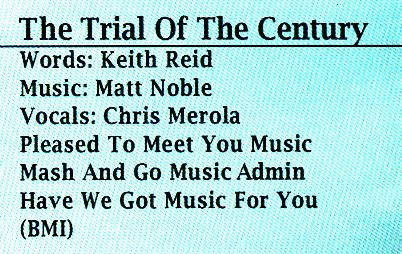 The
Trial of the Century [3.34]
seems to be explicitly about recent, or recent-ish,
legal events.
The
Trial of the Century [3.34]
seems to be explicitly about recent, or recent-ish,
legal events.
Oh, for sure. No question about
it.
You ask lots of rhetorical questions – ‘was he
excluded, or simply deluded, a wolf in sheep’s clothing or merely a sheep’ – but
you don’t commit yourself beyond raising the question.
Well, that’s it, that’s my job. I
wanted to … well I won’t say I wanted to, I was impelled to write
a song about that situation, about my experiences ...
As you said when we started talking, ‘these
songs are about me’. Is this song going to add to people’s understanding of the
Whiter Shade of Pale lawsuit?
Ummmm ... I don’t know. They’ll
certainly hear something about it from my point of view
(laughs).
In fact the song uses the typical
Reid trick of multiple viewpoints: for instance, though ‘slick’, ‘glib’,
‘mirrors and smoke’ may imply that the currency of the lawsuit was illusions,
‘the cat's out the bag’ suggests a revelation of truth. No doubt some will suppose this
‘cat’ refers to Procul Harun, the band’s founding feline. And elsewhere there
are lines like ‘Song sounds familiar, they’re robbing the grave’ that don’t map
conveniently on to the received lawsuit facts (though this instance may remind
us of the exhumation and reburial in Ten More Shows).
Even in the lines that appear to
invite an obvious interpretation, one quickly realises there may be more than
one candidate to inhabit the pronoun ‘he’ … the defendants, plaintiffs, counsels
and judge were all of the male gender. ‘With so many lawyers the truth’s hard to
find’ could be interpreted as ‘even with such a wealth of legal expertise the
truth is elusive’ or else ‘the more lawyers you employ the less likely you are
to get to the truth’.
The words …
see here for the
entire text … are sung with feeling by Chris Merola.
Did you feel Chris Merola
'inhabits' this lyric? Did he know the legal background to the trial?
He didn’t, not at all. And
actually a few different people sang that song, just a few different people,
nobody that you’d know. A few different people in the Bronxville world.
When other people tackled it, did they get as
far as finished vocals?
Yes. I worked on this tune quite a
few times, and Chris’s is the one I liked best.
BtP reviewed
Chris's album
Straight Answer in a Crooked Town. And of course he
plays twelve-string on The Prodigal Stranger … The Hand that Rocks the
Cradle, as I remember.
I’m sure he does … if he said so.
He’s a lovely guy. He’s quite good, I think. I met him through Matt Noble.
Matt who wrote the music here, and has
half-a-dozen Procol co-writes to his name. I haven’t worked
out whether you allotted particular lyrics to particular composers.
Not deliberately. Not on purpose. Not in
terms of thinking, ‘Oh, this will be good for … so-and-so’. Invariably, if you
think that would be good – to get so-and-so in to do it – it turns out that it’s
not (laughs). But this was just one of the songs
… I wrote quite a few songs with Matt, and that was just one of them.
You don’t specify who’s playing what on this
one.
It’s all Matt.
The song starts with clanking
piano triplets accompanying the slightly gruff tones of the singer; a synth bass comes
in for the second verse, and the drums power into the chorus ... in which we
notice some hovering Hammond. A dark scar of 'cello heralds the third verse,
which is again haunted by the organ. The doubled voice gives weight to the
chorus, then the first instrumental break ... a sliver of Bach ... is taken by string sounds and a
glittering harpsichord. Everything winds down to piano and voice again, with
intermittent drum entries that will please PH fans. When the Bach motif returns
its duration is ever-briefer, curtailed by voices hollering the title; then the
whole weighty piece collapses into the ambiguously-intended refrain of 'Give me
break': it's very effective.
Even
though you carefully don’t name names in the lyric, you put a layer of
conspicuous Hammond organ on it, with very characteristic drawbar settings that
counterfeit that classic plangent, nasal Procol sound. And then there’s the Bach
satire, when you bodge a splinter of
Jesu Joy of Man’s
Desiring into the middle of it.
(laughter)
We tried a couple of things, and Matt did that and I said,
'Oh, I
really like that.'
So it was your idea to sling some Bach in?
We were just playing around,
trying to do something à propos. And I wanted to emphasise it as well, as
I recall.
There’s another mixed-up proverb, your own take
on ‘Give a man enough rope and he’ll hang himself’.
I was trying to express that idea, but it would have sounded clumsy. I’m saying
that in my own words. ‘Don’t need a hangman when you’ve got enough rope’
And when you decide to make a record, you
probably type out some song words … do you send 'Song A' to several composers and
see if it strikes a note with them …
No, it’s not quite like that, because it’s an
accumulation … I’m trying to think how it came about
… pause …
those songs, when I was doing them with Matt … those were days I was working
with him, and I had a bunch of lyrics and we just started working on things and
that one started to come together.
So it doesn’t mean there’s
a Steve Booker setting of this song in the bin somewhere?
Oh no, no no no, not at all.
I think we have a lingering
impression inherited from Procol days that sometimes a lyric got set by more
than one person: Crucifiction Lane, for instance?
Yes, but that was a slightly
different situation. I mean you could sit down and work on a song with
one person and think, ‘It hasn’t worked out, I’m going to try it again with
somebody else.’ I’m sure people do do that, but it’s not really fair, if
you see what I mean. If you sit down and work with somebody, and that happens,
you probably ditch the whole thing: it’s just something that didn’t work out.
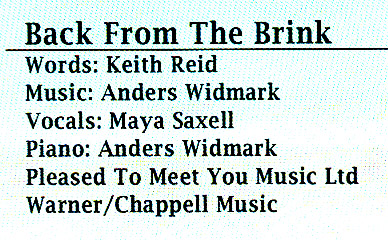
A song that definitively did
work out, to this listener’s ears, is Back from the Brink (3.47).
This is a doom-laden miniature, voice and piano only, which
may strike some listeners as a grandchild of
Barnyard Story …
though composer Anders
Widmark’s piano is riddled with sprightly rhythms, countering the slow plaint of
Maya Saxell’s vocal. It’s an old-fashioned, artful tune, decorated with
intriguing intervals and variant harmonies that keep the ear in a constant state
of engagement and surprise.
Scandinavian readers may well know this
song already, from the Mikael Rickfors version. His 2004 Lush Life album also
features Dance with Me, which is freshly interpreted as the penultimate track on
In My Head.
Yes those two songs were written
much earlier, but they weren’t in my mind back then, as candidates, when I was choosing
material for The Common Thread. Michael is a very fine singer. But I
haven’t heard his versions for ages: they didn’t play any part in my thinking
about In My Head.
It could be argued that Rickfors’s
regular, metrical delivery undersells the lyric. Its topic, after all, is a
super-serious one – mountains of pain, the threat of imminent catastrophe, the
ubiquitous passing of the buck – and the carefully-planned rhymes don’t want to run the risk of sounding like
doggerel.
We go lighting a fuse
When there’s so much to lose
Grow that mountain of pain ever faster
Let’s draw back from the brink
Cos we don’t wanna sink
And it’s all going to end in disaster.
Rickfors's workmanlike delivery, over a
backing of piano, upright bass, drums and a handful of brass, lacks Maya’s sense
of exploration of the ideas in the song. Her freer, more introverted delivery
gives a properly thought-provoking weight to the cunning irregularities of the
lyric, in which we hear sometimes ‘mountain of pain’ and sometimes ‘mountain of
shame’, sometimes ‘don’t wanna sink’ and sometimes ‘don’t wanna think’.
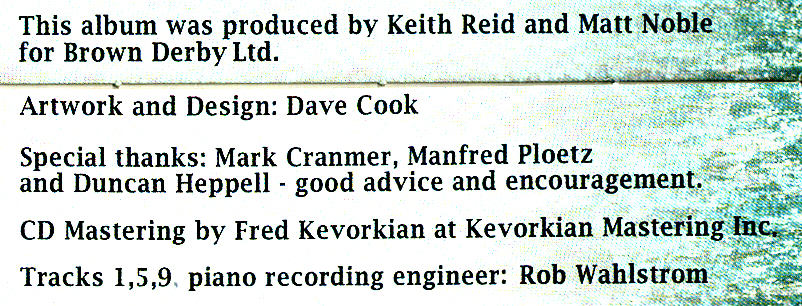 The
opening line, ‘Put away those childhood toys’ arguably describes what’s
happening in the Ten More Shows
video. Alliterative decoration is attractively handled – ‘bricks … bats’,
‘tricks … traps’ – yet Reid also sidesteps that effect, giving us ‘trinkets
and bangles and beads’, dodging the clichéd ‘bauble’. To this reviewer it’s one
of the finest lyrics on the record, eschewing songwriterly formulae, yet obeying
its own inner logic.
The
opening line, ‘Put away those childhood toys’ arguably describes what’s
happening in the Ten More Shows
video. Alliterative decoration is attractively handled – ‘bricks … bats’,
‘tricks … traps’ – yet Reid also sidesteps that effect, giving us ‘trinkets
and bangles and beads’, dodging the clichéd ‘bauble’. To this reviewer it’s one
of the finest lyrics on the record, eschewing songwriterly formulae, yet obeying
its own inner logic.
It’s a bit like the older Reid style, ‘all going
to end in disaster,’ an undertow of pessimism … but here embodying a call to come ‘back
from the brink.’ Which makes a great hook.
You know, The Bank of Worry started out from that line, but
Back from the Brink was different … that
line came along as I wrote the song.
The sound of the track is unique
on the album. Maya sings her own, haunting harmony vocal, and the skipping,
rhythmically playful piano (its forty-second coda reminiscent of Jacques
Loussier) appears distinctly treated. Keith explains:
No, I know what you mean, it’s the same piano
as in the other two piano tracks. I know what you mean. It sounds as if it’s got
an effect on it, but it hasn’t. It just happened like that. There were really
weird echoes in the room. It’s not digital. Some magical force took over.
The piano tracks were done over a
few days but this is the only one on which that effect was observed. The
recording engineer on the Anders Widmark numbers receives a special credit; but
Keith concedes that there’s a mistake in its track-references..
It should be 1, 7, 9. I think what
happened there is that this running order got changed a few times. You’ve spotted a mistake. Maybe you’ll be the only person to spot
that!
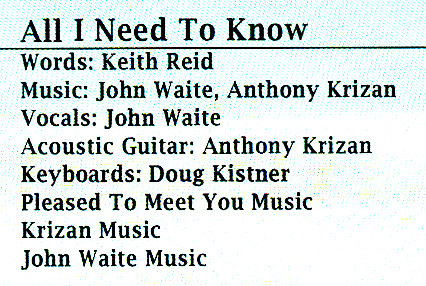 All
I Need to Know (5.06) starts gently with a couple of acoustic
guitars, John Waite's character-filled voice picked out with distant, watery reverb.
Doug Kistner's piano lends emphasis, and vibrato string sounds soon well up from
the background, as the temperature of Waite's singing rises. The lack of drums
is notable, and the guitars provide all the necessary rhythmical impetus.
All
I Need to Know (5.06) starts gently with a couple of acoustic
guitars, John Waite's character-filled voice picked out with distant, watery reverb.
Doug Kistner's piano lends emphasis, and vibrato string sounds soon well up from
the background, as the temperature of Waite's singing rises. The lack of drums
is notable, and the guitars provide all the necessary rhythmical impetus.
My love
lies in shadows
Ten silent fathoms deep
I swim through dark waters
to watch her sleep
This reminds me faintly of
Love Minus Zero /
No Limit: ‘My love she speaks like silence.’
I love that, that’s a great one. I
haven’t heard that for years.
It’s as if a drop of Dylan has
fertilised the soil from which Broken Barricades once grew: but
here the imagery of tides, seashells, and wastelands is redemptive.
What’s the story of this one?
Once again, I met John Waite
though Frankie LaRocca back in the day, and wrote songs with him for his record.
We just remained friends and occasional writers.
Waite's In God’s Shadow
is a favourite off The Common Thread.
Yes, I like that one a lot. All
I Need to Know? I was working with John and Anthony and they had the tune
going, and basically I wrote that in New York, and I think I just went back to
my loft … I had the tune, not completed, but the musical basis was there.
What’s that glittering sound, in later
verses, like a glass
harmonica?
It’s some kind of keyboardy thing.
Waite's performance is emotive but
not overdone: he has an incisive yet sympathetic voice which compels any
listener's attention. Core aspects of this song feel
reminiscent of Gary Brooker’s recent solo track, Somewhen,
which posits the reunion of lovers at the end of their mortal life, though I
don’t ask Keith if he’s heard that.
I give
her my very heart … till death us part ..
but someday I’ll be with her and that’s
all I need to know.
If this level of directness and emotional honesty doesn’t sound like Keith Reid
... it may be time to revise your opinion of his range!
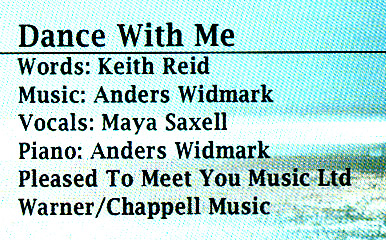 And the same applies to
Dance with Me (4.04)
And the same applies to
Dance with Me (4.04)
Won’t you
dance with me, close to me …
when you
dance with me nothing else feels real
In Maya Saxell’s halting, inward treatment, a lyric that arguably bordered
on the sentimental in Mikael Rickfors’s 2004 version now becomes a sensual and
existential investigation of the core question, ‘Is it only dreams that we pursue?’
One life, one wish …
that will do …’.
A settled wisdom has replaced the
signature nihilism of Reid’s early lyrical excursions; and although there’s
still an acknowledgment of uncertainty, the poet now finds reassurance and
adventure in doubt.
Life … it’s not being afraid … it’s ‘don’t know for
sure’
'New songs are old songs' is a
paradoxical proposition, and runs counter to both sides of the argument in the
title song of this collection. But Saxell's voice draws us into this song about
songs, and purges any saccharine potential from lines like 'your song is my song'
thanks to the mysterious intimacy of her delivery. 'She sings it great,' says Reid, a
couple of times. And Widmark plays it great too, voicing his own chords with
delicious attention to detail ... basslines, tripletty fills, occasional
passages played hymnally straight, sudden 'Piccadilly thirds' ... it's
compelling listening.
I tried ten zillion instruments on
that track, then chucked them all out. On quite a few of these tunes I tried all
kinds of stuff. Definitely on the piano ones, and some of the others, just
trying different stuff out to see what worked. Strings, drums, bass, you name
it.
They all started with a full performance on
piano?
I didn’t think they added anything.
Laughter.
I certainly tried!
I don’t feel the loss.
No, there’s a lot of depth to his
playing, and the harmonics.
Keith tells me that this Dance with
Me was not made with reference to the Rickfors version, nor was the decision to
eschew additional instruments related in any way to the 2004 record’s reliance
on upright bass, brushed kit, steel guitar, sax and trumpet to suggest a
cocktail-bar ambience. But as he rightly observes,
Even if you pared all [Rickfors’s]
stuff down to voice and solo piano, the feel would be very different.
It certainly would. Widmark is a
very inventive player, exploring the full range of the piano, and one gets
a sense of the restraint he habitually practises when, suddenly, at about the
three-minute mark, he erupts into a wild piano break, as unexpected and effective as the classic moment on
The Hissing of Summer Lawns where Joni Mitchell’s Harry’s House is interrupted
and offset by the jazz standard Centrepiece. Widmark's exhalations,
guttural exclamations and other Oscar Peterson-like behaviours are fearlessly commemorated in
this exciting recording. Then he reins himself back, and Maya returns – almost
an afterthought – for a couple of lines which restore the original feel of the
song.
You can hear him banging the floor
with his foot, which is great.
As producer, had you suggested a piano break at
that point?
No no, but actually funnily enough
with that tune he was used to doing it much more up-tempo. The way he envisaged
that tune, and the way we did it, are very different. Because he envisaged it as
an up-tempo rock and roll tune, and I said ‘Do it like this, and put that bit as
the opening’. I had quite a lot to do with the arrangement of that tune. Nothing
to do with the performance, but a lot to do with the way it turned out, and it
wasn’t how Anders had envisaged it whatsoever. In his mind it sounded more like
The Who or something like that.
So as
producer Keith Reid pulled things back from the brink, as it were.
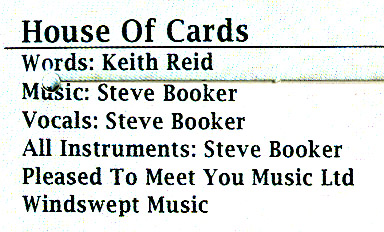 Thus the record, which represents a lot of pruning and winnowing, ends with
another Booker/Reid
song, House of Cards (4.43).
Guitar, bass, gentle drums, and some organ hovering about in
the background, create an initial wash of sound, which recedes as Steve Booker's warm
tones take centre stage, venturing convincingly into his high register from time
to time. The chords in the nicely-harmonised chorus are unpredictable, the hook
catchy: the chromatic bassline is an appealing feature too.
Thus the record, which represents a lot of pruning and winnowing, ends with
another Booker/Reid
song, House of Cards (4.43).
Guitar, bass, gentle drums, and some organ hovering about in
the background, create an initial wash of sound, which recedes as Steve Booker's warm
tones take centre stage, venturing convincingly into his high register from time
to time. The chords in the nicely-harmonised chorus are unpredictable, the hook
catchy: the chromatic bassline is an appealing feature too.
In a carefully-engineered lyric Keith takes a wander through
his playing cards, conflating gambling lingo with the fragility of a house of
cards, and also using the ‘heart’ image as a pivot into the world of a doomed
romance.
Love has many faces
Tell me how does it feel
when you’re holding aces
you can’t deal.
House
of Cards … not sure I've entirely warmed to this one yet, though the chorus is nice.
What are its strengths from your point of view?
I just liked it.
I could imagine someone else taking this one up.
Maybe somebody else will? Could you do that
for me, tout it around?
Laughter
Are these songs calling-cards?
I didn’t write them with that
intention. Maybe House of Cards is a
bit more mainstream.
The romance narrative is
judiciously defocused so that the listener can find her or his own resonances:
no doubt some will seek to inscribe what they
think they know of the poet’s history on to the final lines:
And the
world you made
Has all gone up in flames
The best hand’s been played
And it’s too late to save
Your house of cards
As on The Common
Thread, it’s a
Booker/Reid song that closes this album. I wonder how Keith resisted the
temptation to close symmetrically, bookending the whole show with another Maya Saxell
song.
I felt House of Cards
couldn’t have been anywhere else but the last track.
You told me that the running order for the first
album had exercised you almost as much as any other aspect of it. Here you had
four Maya ones to spread out … did that make it harder?
Let me just say that it went
through quite a lot of juggling, and even when I delivered the record to Manfred
he had his own ideas, and I listened to a few other people as well. I always
wanted it to open with This Space is Vacant and everything else was just
juggling to see what fitted where musically. I tried many permutations.
And (as with Procol) the running order is
determined according to musical considerations, rather than lyrical ones?
Totally. People’s keys, voices ….
you know, whose voice sounds good following someone else’s voice. No lyrical
reasons.
What
have I omitted to ask you?
I’ve no idea. You’re pretty much the first
person I’ve ever spoken to about it. I’ve no idea what anyone would make of it,
really. Laughter.
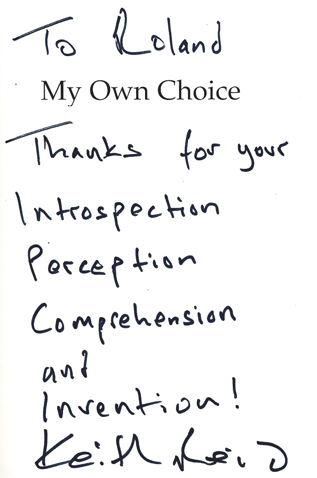 I tell Keith that I realise my
response is pretty skewed, partly since I've taken a strong interest in his writing since I was fourteen, and
partly since I've spent many decades being paid to help readers see the
trees, real and imaginary, in many intriguing literary woods.
I tell Keith that I realise my
response is pretty skewed, partly since I've taken a strong interest in his writing since I was fourteen, and
partly since I've spent many decades being paid to help readers see the
trees, real and imaginary, in many intriguing literary woods.
‘I’m always impressed with your
painstaking approach, always impressed,’ he says; but we do agree that the
record is not aimed at a constituency that will especially want to milk it for Procol
allusions!
Yes, in an ideal world you want
people to know nothing about it, and like it. You want someone to like it
because they come to it with no preconceptions.
By now night is falling, and November
is making itself felt: even dawn-swimmers in The Serpentine start to feel a little chilly. As we prepare to leave the Madjeski Courtyard, a
discerning V&A mouse emerges from the shrubbery in search of crumbs fallen from the poet’s table. ‘At least it’s not a rat,’ Keith observes.
I don’t want to wait ten years for
the next Reid solo album (Will its title rhyme? Is there a lurking joke here, a
long series – The Common Thread, In My Head – whose dark punchline ends with the word Dead?). I want Keith to book a
venue, a
piano, and a guitar, and present Anders Widmark, Maya Saxell and John Waite in
concert … to hear these very interesting songs in front of a live audience would complete them.
But I don’t mention this: he’s busy signing my copy of his anthology,
My Own
Choice, published in 2000 by Charnel House.
I'm glad Reid is still working, doing such interesting stuff, and happy to have
been among the first to talk with him about the new record.
Good luck with The KRP. It’s not a veiled reference to
Mr Krup, is it?
I wasn’t thinking that.
It doesn’t matter whether you were consciously thinking it
… laughter.
When I read Keith's inscription on the
title-page, I notice that his instinctive propensity to rhyme has enshrined some
mischief at the expense of my instinctive propensity to over-interpret. 'Guilty
as charged,' I tell him, as we shake hands. 'Take care, man,' is his valediction.
Then, as aforesaid, he’s off the
pavement and into
the traffic.
Buy In My Head
from Amazon.co.uk or
from Amazon.com
 Keith is no stranger, however, to
nearby Hyde Park,
where, he tells me, he belonged for a year to the
Serpentine Swimming Club, and
swam there daily at 7 am. ‘In winter you can’t stay in for long, of course, but
the blood rushes out to your skin …’. Sounds exhilarating, I say, but is it good
for you? With a gesture straight out of Waiting for Godot he indicates
his own person, inviting me to judge for myself.
Keith is no stranger, however, to
nearby Hyde Park,
where, he tells me, he belonged for a year to the
Serpentine Swimming Club, and
swam there daily at 7 am. ‘In winter you can’t stay in for long, of course, but
the blood rushes out to your skin …’. Sounds exhilarating, I say, but is it good
for you? With a gesture straight out of Waiting for Godot he indicates
his own person, inviting me to judge for myself. Our topic – pretty well
exclusively – is his new album,
Our topic – pretty well
exclusively – is his new album,  The
first track on the album is a huge surprise, I tell him. This Space is
Vacant (4.10) – intimately sung by Maya Saxell, and accompanied
exquisitely at the piano by Anders Widmark, a big name in Swedish jazz – marks a
major departure from the tone and density of The Common Thread. I ask if
Maya is related to 2008 Reid collaborator Michael Saxell, the Grammy-award
winning Swedish hit-meister. The answer comes back, immediate, fluent.
The
first track on the album is a huge surprise, I tell him. This Space is
Vacant (4.10) – intimately sung by Maya Saxell, and accompanied
exquisitely at the piano by Anders Widmark, a big name in Swedish jazz – marks a
major departure from the tone and density of The Common Thread. I ask if
Maya is related to 2008 Reid collaborator Michael Saxell, the Grammy-award
winning Swedish hit-meister. The answer comes back, immediate, fluent. Needless
to say the second track, which gives its name to the whole collection, presents
an enormous contrast. Prominent lead guitar (textural, not really melodic, and
sometimes recorded backwards), groovy beats, and an assertively mobile bass line are provided by The Spin
Doctors’ sometime guitarist Anthony Krizan, who also sings.
Needless
to say the second track, which gives its name to the whole collection, presents
an enormous contrast. Prominent lead guitar (textural, not really melodic, and
sometimes recorded backwards), groovy beats, and an assertively mobile bass line are provided by The Spin
Doctors’ sometime guitarist Anthony Krizan, who also sings.
 Thieves’
Road (4.45) doesn’t concern itself with jail, nor the courts, but offers
a kind of admonition to an unnamed ‘you’ who ‘… rode your winning streak down
where the crossroads meet’. The language remains somewhat indeterminate, and,
like the music, doesn’t offer too many surprises. Sprightly acoustic rhythm
guitar, solid four-to-the bar bass, rhythm shakers, piano and languid, slightly-distant lead guitar offer a pleasing,
if unvarying, listening experience. By
comparison with the foregoing numbers, this Booker/Reid song seems a more
mainstream piece of work.
Thieves’
Road (4.45) doesn’t concern itself with jail, nor the courts, but offers
a kind of admonition to an unnamed ‘you’ who ‘… rode your winning streak down
where the crossroads meet’. The language remains somewhat indeterminate, and,
like the music, doesn’t offer too many surprises. Sprightly acoustic rhythm
guitar, solid four-to-the bar bass, rhythm shakers, piano and languid, slightly-distant lead guitar offer a pleasing,
if unvarying, listening experience. By
comparison with the foregoing numbers, this Booker/Reid song seems a more
mainstream piece of work. On
On
 One
song on the album that does instantly conjure up its own visual imagery is
The Bank of Worry (3.05): it’s so easy to imagine a film in which its
genial singer, Jeff Young, beckons viewers inside the portals of some imposing
building.
One
song on the album that does instantly conjure up its own visual imagery is
The Bank of Worry (3.05): it’s so easy to imagine a film in which its
genial singer, Jeff Young, beckons viewers inside the portals of some imposing
building. It
feels a good moment to turn to the rather worrying record cover, which shows a
man and a red-eyed whale. The man's body-language looks untroubled … he’s got a lifebelt, after
all … yet both he and the whale are on dry land … and they're both baring their teeth.
It
feels a good moment to turn to the rather worrying record cover, which shows a
man and a red-eyed whale. The man's body-language looks untroubled … he’s got a lifebelt, after
all … yet both he and the whale are on dry land … and they're both baring their teeth.  The
Trial of the Century [3.34]
seems to be explicitly about recent, or recent-ish,
The
Trial of the Century [3.34]
seems to be explicitly about recent, or recent-ish,

 The
opening line, ‘Put away those childhood toys’ arguably describes what’s
happening in the Ten More Shows
video. Alliterative decoration is attractively handled – ‘bricks … bats’,
‘tricks … traps’ – yet Reid also sidesteps that effect, giving us ‘trinkets
and bangles and beads’, dodging the clichéd ‘bauble’. To this reviewer it’s one
of the finest lyrics on the record, eschewing songwriterly formulae, yet obeying
its own inner logic.
The
opening line, ‘Put away those childhood toys’ arguably describes what’s
happening in the Ten More Shows
video. Alliterative decoration is attractively handled – ‘bricks … bats’,
‘tricks … traps’ – yet Reid also sidesteps that effect, giving us ‘trinkets
and bangles and beads’, dodging the clichéd ‘bauble’. To this reviewer it’s one
of the finest lyrics on the record, eschewing songwriterly formulae, yet obeying
its own inner logic. All
I Need to Know (5.06) starts gently with a couple of acoustic
guitars, John Waite's character-filled voice picked out with distant, watery reverb.
Doug Kistner's piano lends emphasis, and vibrato string sounds soon well up from
the background, as the temperature of Waite's singing rises. The lack of drums
is notable, and the guitars provide all the necessary rhythmical impetus.
All
I Need to Know (5.06) starts gently with a couple of acoustic
guitars, John Waite's character-filled voice picked out with distant, watery reverb.
Doug Kistner's piano lends emphasis, and vibrato string sounds soon well up from
the background, as the temperature of Waite's singing rises. The lack of drums
is notable, and the guitars provide all the necessary rhythmical impetus.  And the same applies to
Dance with Me (4.04)
And the same applies to
Dance with Me (4.04) Thus the record, which represents a lot of pruning and winnowing, ends with
Thus the record, which represents a lot of pruning and winnowing, ends with
 I tell Keith that I realise my
response is pretty skewed, partly since I've taken a strong interest in his writing since I was fourteen, and
partly since I've spent many decades being paid to help readers see the
trees, real and imaginary, in many intriguing literary woods.
I tell Keith that I realise my
response is pretty skewed, partly since I've taken a strong interest in his writing since I was fourteen, and
partly since I've spent many decades being paid to help readers see the
trees, real and imaginary, in many intriguing literary woods.